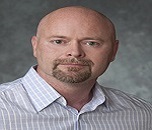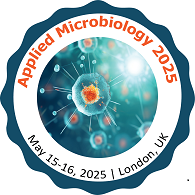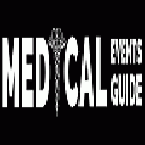About conference:
Join us for the Applied Microbiology 2025 conference, where renowned experts from academia and industry will converge to explore cutting-edge developments and pressing challenges in applied microbiology. This engaging event will showcase essential presentations, thought-provoking speaker sessions, interactive workshops, and a vibrant exhibition area. Key themes span across medical and pharmaceutical microbiology, industrial and food microbiology, microbial biotechnology, water microbiology, and agricultural applications, among others. With a strong emphasis on real-world solutions and innovations, Applied Microbes 2025 offers an unparalleled opportunity for knowledge-sharing and collaboration, fueling research and driving advancements across diverse fields. Don’t miss this chance to connect with peers and push the boundaries of applied microbiology!
The Applied Microbiology 2025 Conference serves as a premier gathering for biologists, scientists, researchers, students, and technologists dedicated to advancing knowledge in microbial interactions, evolution, diversity, and ecological roles. This international event aims to foster insights into potential organismal interactions and to explore new experimental techniques that could inform sustainable practices and regulatory measures to manage microbial ecosystems effectively.
Attendees will have the unique opportunity to engage with leading experts, influential researchers, industry leaders, and emerging voices in microbiology, making this a landmark event in the field. The conference emphasizes the importance of collaborative research and networking to inspire new partnerships and transformative projects.
About Organizing:
The world's leading expert in organizing academic, scientific, and business conferences, meetings, symposia, and exhibitions in various vertical and horizontal sectors, including medical, pharmacy, engineering, science, technology, and business to advance scientific research is Conference Series LLC Ltd. With the kind assistance and collaboration of our 30,000 editorial board members and more than 1,000 scientific societies, we annually host over 3,000 international events, including more than 1,000 conferences, symposia, and workshops throughout the United States, Europe, the Middle East, and Asia. The DOI generated by CROSSREF is included in special issues of our 700+ international open access journals that publish all conference proceedings.
Why to Attend?
-
Collaborate and Connect: Meet influential contacts and explore new opportunities for partnerships and collaborations across various fields.
-
Accelerate Progress: Gain insights from the most recent advances and apply them to your work for impactful results globally.
-
Key Attendees and Decision-Makers: Approximately 89 key decision-makers and lab representatives are expected, providing ample opportunity for meaningful connections.
-
High Interaction Rate with Exhibitors: Eighty percent of attendees visit exhibitors multiple times, creating strong networking and business development prospects.
Session and Tracks:
Track 1: Microbiology & Molecular Biology:-
Nucleic acids, such as DNA and RNA, are complex organic compounds found in living cells. These large molecules consist of long chains of nucleotides linked together. Each nucleotide contains a phosphate group, a sugar, and a nitrogenous base, which can be a purine or pyrimidine. When broken down, nucleic acids yield phosphoric acid, sugars, and a mix of organic bases. Their intricate structure plays a crucial role in storing and transferring genetic information, making them fundamental to cellular function and the continuity of life.
Track 2: Advances in Applied Microbiology:
Presents cutting-edge research across diverse areas of microbiology, emphasizing microbial biotechnology, health interactions, and agricultural applications. This comprehensive resource explores critical topics such as microbial enzymes, nanoparticles, bacterial polyhydroxyalkanoates, and the role of biosurfactants in bioprocessing. It also delves into pressing issues like multidrug-resistant bacteria, probiotics, and the therapeutic potential of fungal chondroitin’s. Tailored for masters, doctoral, and postdoctoral researchers, as well as graduate-level courses, this book is an invaluable asset for scientists engaged in interdisciplinary studies within life sciences.
Track 3: Clinical microbiology:
Clinical microbiology is a branch of science focused on the interactions between microorganisms and microorganisms in both healthy and pathological states, emphasizing their roles in disease processes and treatment outcomes until clinical recovery is achieved. The Clinical Microbiology curriculum is crafted to equip trainees with comprehensive training in medical microbiology, virology, infection prevention, and infectious diseases, while also ensuring they acquire essential core competencies vital for effective medical practice.
Track 4: Microbial Biotechnology:
Microbial biotechnology represents a groundbreaking intersection of science and application, utilizing microbial agents to tackle critical challenges in agriculture and industry. By employing genomic insights, this field pioneers innovative strategies for pest management, including the development of safer biological controls and the engineering of pathogens to lower their virulence. It also fosters the creation of novel industrial catalysts and fermentation processes, while advancing bioremediation techniques to cleanse contaminated soils and waters. This multifaceted discipline is essential not only for enhancing biotechnological applications but also for enriching human nutrition and fortifying the health of plants and animals, laying the groundwork for sustainable agricultural practices.
Track 5: Medical Microbiology:
Medical microbiology is a vital discipline that investigates the intricate relationship between microorganisms and human health. This field focuses on the prevention, diagnosis, and treatment of infectious diseases caused by diverse pathogens, such as bacteria, fungi, parasites, viruses, and prions. Beyond merely combating infections, medical microbiology delves into the therapeutic potential of microbes, exploring their use in innovative clinical applications that can enhance health outcomes and improve patient care.
Track 6: Biotechnology:
Biotechnology represents a dynamic fusion of traditional practices and cutting-edge techniques designed to optimize biological systems for human advancement. From the ancient domestication of animals and selective breeding of plants to modern innovations such as genetic engineering and cell culture, biotechnology harnesses nature's potential in new ways. This evolving field not only enhances food security and medical therapies but also opens doors to sustainable solutions for environmental challenges.
Track 7: pharmaceutical microbiology:
Pharmaceutical microbiology is a specialized field that merges microbiology with pharmaceutical sciences to enhance drug development and production. It investigates the role of microorganisms in creating anti-infective agents and ensures the integrity of pharmaceutical environments by controlling microbial contamination. This discipline also focuses on the removal of harmful microbial byproducts, such as exotoxins and endotoxins, safeguarding the safety and effectiveness of medicines. By harnessing beneficial microbes and mitigating risks, pharmaceutical microbiology plays a critical role in advancing healthcare and pharmaceutical innovation.
Track 8: Food Microbiology:
Food microbiology examines the bacteria that inhabit, transform, or contaminate food. It studies spoilage microbes, foodborne pathogens, and beneficial organisms used in fermentation for products like cheese, yogurt, and beer, as well as probiotics that support gut health, highlighting the vital role of microbes in food safety and quality.
Track 9: Environmental Microbiology:
Environmental microbiology studies how microorganisms interact with their environments, including the spread of viruses, bacteria, algae, fungi, and parasites. It explores their roles within ecosystems—spanning the atmosphere, hydrosphere, and litho-ecosphere—and examines how these microbes influence and in influenced by their surroundings, which is essential for understanding ecosystem health and environmental changes.
Track 10: Industrial Microbiology:
A branch of biotechnology known as microbial biotechnology leverages microbial sciences to produce industrial commodities at scale, utilizing microbial cell factories. By manipulating microorganisms through various methods, such as exposing them to mutagens to induce mutations or employing gene amplification techniques, scientists can enhance product yields significantly. These strategies enable the efficient production of a wide range of valuable substances, from pharmaceuticals to biofuels, driving innovation in sustainable industrial practices.
Track 11: Advanced Research In Microbiology
Microbiology is the study of microscopic organisms, including bacteria, archaea, viruses, fungi, prions, protozoa, and algae, collectively known as microbes. This field is divided into two main branches: pure microbiology, which focuses on the theoretical aspects of these organisms, and applied microbiology, where microbes are utilized in practical applications like fermentation and biotechnology. Additionally, microbiology can be classified by taxonomy into specific areas such as bacteriology, mycology, protozoology, and phycology, often overlapping with other scientific disciplines.
Market Analysis:
Microbiology testing is expanding as a result of the rising number of aerobic and anaerobic tests related to mycobacteriology, parasitology, and virology. The World Health Organization estimates that 7 million Americans contract influenza each year. This leaves a wide scope of growth for research and development proficiencies pertaining to microbiology testing.
According to Data Bridge Market Research, the microbiological testing market is projected to grow significantly, reaching USD 8.24 billion by 2025 from USD 4.23 billion in 2021, with a CAGR of 8.63% during the forecast period. The market is primarily driven by pharmaceutical applications, supported by established regulations governing microbial contamination assessments. The comprehensive report from Data Bridge includes expert analyses on patient epidemiology, pipeline and pricing analysis, and the regulatory landscape, providing valuable insights into market dynamics.
























